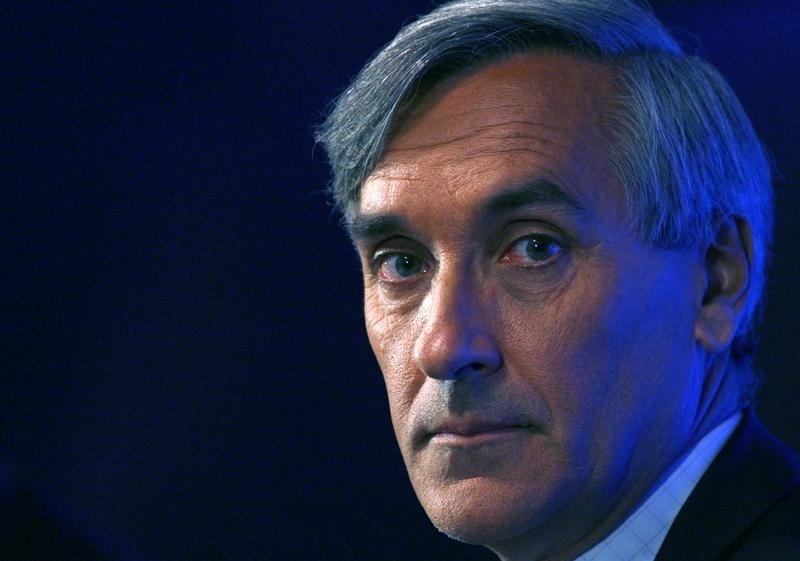By Guy Faulconbridge
LONDON (Reuters) - Britain should leave the European Union quickly and not be drawn into a discussion about watering down the voters' clearly expressed wish for limits on immigration, senior Conservative lawmaker John Redwood said.
Redwood, an intellectual leader of the Brexiteers in Prime Minister Theresa May's ruling Conservative party, said a swift exit that ensured tariff-free trade with the rest of the EU was achievable.
Mapping out options for Brexit, Redwood said parliament could accelerate the process by repealing the 1972 European Communities Act and then simply notifying the EU of the decision to leave, potentially moving towards an exit within months.
"I want the full Brexit and I would get straight on with it," Redwood said in a telephone interview, adding that opponents of Brexit had underestimated the strength of Britain's hand in talks over its EU divorce.
"There are an awful lot of people who want to make money out of Brexit by making it much more complicated than it need be and yes some people absolutely want to water it down."
The comments indicate the delicacy of the domestic balancing act May will have to perform as she prepares to negotiate with leaders such as German Chancellor Angela Merkel on pulling the world's fifth largest economy out of the EU.
With a parliamentary majority of just 17, May will have to take notice of the views of Members of Parliament like Redwoood, who are determined to force her to deliver a Brexit in line with their desire to control immigration.
May, who won the top job in the political chaos unleashed by last month's referendum vote to leave the EU, insists that "Brexit means Brexit". But she will not invoke Article 50, the part of the EU's Lisbon Treaty that allows member states to leave, before the end of the year.
FREEDOM OF MOVEMENT?
EU leaders are refusing to countenance a "Europe a la carte" by letting London select the parts of its future relationship that it likes while dispensing with EU principles such as the free movement of people.
Merkel says Britain needs time to put together a negotiating stance before triggering the formal divorce. But she has also cautioned that Britain cannot cherry-pick the parts of the EU that it wants to keep.
French President Francois Hollande and other EU leaders, have urged May to deliver Brexit soon and say Britain should not have full access to the European Single Market of 500 million consumers without accepting freedom of movement.
May has said British voters made it clear they want controls over freedom of movement.
But Redwood, who supports May, said there should be no negotiation over whether to limit freedom of movement.
"We shouldn't negotiate over freedom of movement, or getting our money back or having our own laws: We are quite happy with the current tariff-free trading arrangements," he said.
"We voted to take back control. That means control of our laws, control of our borders, control of our money, and those things are not going to be negotiated - they cannot be. It said on the ballot paper "Leave" and that is what people voted to do."
Redwood said that after Brexit, Britain was likely to keep tariff-free trade with the other 27 members of the EU as they would face tariffs on exports to Britain if they did try to erect barriers.
BREXIT TRADE
The best option, Redwood said, would be to keep the current tariff-free trading relationship including so called passporting -- which allows financial services firms in London to do business in Europe -- without getting into a discussion over controls on freedom of movement.
"Ideally we just keep tariff-free trade and passporting and all the other arrangements we have at the moment and I think it is very likely we will keep that because I think they want them as much as we want them," he said.
"I would suggest they take what I would hope is our very generous offer of having tariff-free trade and carry on with no interruption," he said.
He said that if the EU refused to agree to tariff-free trade then Britain would have to impose tariffs under World Trade Organisation rules, which he said limit such tariffs to an average of 3.5 percent.
"It is up to the other 27 to sit down and see whether they can agree on what barriers they wish to impose on their trade with us. And I'd be a bit surprised if they came up with a set of barriers but if they did they would have to be WTO-compliant and we would then obviously retaliate under WTO rules."
Redwood said talk of a potential emergency brake that would allow Britain to limit immigration for seven years and keep access to the single market was ridiculous.
"Taking back control over the borders is not negotiable," he said. "That isn't leaving."
"We didn't vote to have another negotiation to try to improve on Mr Cameron's negotiation," Redwood said, referring to former Prime Minister David Cameron's attempt to win concessions from EU leaders ahead of the referendum.
Redwood said that under a reform of EU securities law known as the Markets in Financial Instruments Directive II (MiFID II), financial services companies based in the UK would get passporting back anyway.
"If by any chance they make us go through the WTO route you get the passports back through the MiFID II doctrine of equivalence anyway," he said.

Some bankers agree with Redwood, though they note that it is up to the EU whether equivalence is granted in a process that has no set timetable and is prone to political horse trading. And any EU changes to MiFID II rules in the future would have to be implemented by London to ensure equivalence.